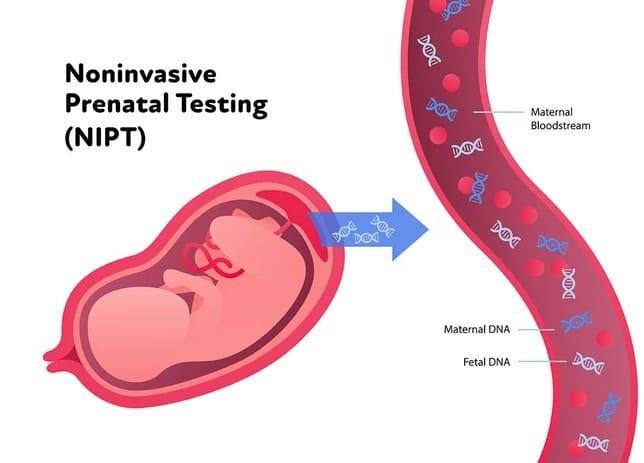The NIPT test – Noninvasive Prenatal Test
Your blood contains a small amount of DNA from the placenta. This DNA is almost always the same as that of your child. The laboratory can then investigate whether your child has an indication of syndromes such as Down, Edwards or Patau syndrome. The NIPT is a screening test. Our midwife will explain it to you and you can decide for yourself whether you want to have the test performed.
The NIPT examines the DNA (i.e. the chromosomes) in the mother’s blood. If you are pregnant, your blood contains not only your own DNA, but also a small amount of DNA from the placenta. The DNA from the placenta is usually the same as the DNA of your child. Does the NIPT find an indication of a chromosomal abnormality? Then further investigation is necessary to determine for sure whether it concerns a chromosomal abnormality in the child. It could also concern a chromosomal abnormality in the placenta or very occasionally in the mother. We will tell you more about this during the consultation. The consequences of a chromosomal abnormality in a child are always serious. But you don’t know in advance how serious it is. That is different for each child. The child can therefore develop a mental disability and physical abnormality(ies).
- The NIPT does not offer 100% certainty
- The NIPT can be performed from 10 weeks of pregnancy
- The NIPT result can be abnormal or non-abnormal
- The result takes 1 week
- The NIPT does NOT provide a result about the sex of the baby
- The NIPT does not find all abnormalities in the chromosomes. Even if the result is non-abnormal, there is a small chance that your child still has a chromosomal abnormality.
- Approximately 993 out of 1,000 pregnant women receive the result that there is no indication of a chromosomal abnormality.
The midwife will provide you and your partner with more information about the test and what the results mean during the consultation. You decide for yourself whether you want screening. The midwife will guide you through this. This way you can make a well-informed decision.

The NIPT test (Noninvasive Prenatal Test) is a screening test. You can have your blood tested around 11 weeks to see if there is any indication that your child has Down syndrome (trisomy 21), Edwards syndrome (trisomy 18) and Patau syndrome (trisomy 13). The laboratory will test if your child has any indication of Down syndrome, Edwards syndrome or Patau syndrome.
You will receive the results of the NIPT test within 10 calendar days.
No, the NIPT does not look at sex chromosomes in the Netherlands. So you do not know whether you are going to have a boy or a girl. If you do want to know, you can do a pretecho at 14 weeks. We then use the ultrasound to see what you will get.